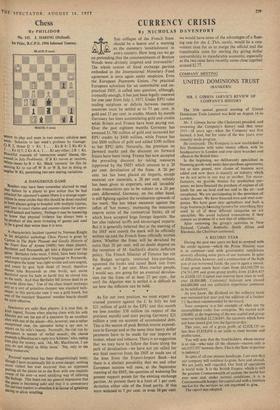Chess
By PHILIDOR No. 115. J. HARING (Holland).
1st Prize, B.C.P.S. 1956 Informal Tourney.
BLACK (9 men)
WHITE (9 men)
WiltrE to play and mate in two moves: solution next ‘vee_ k• Solution to last week's problem by Gamage: kt---R 2, threat Q x Kt. 1 . . . Kt-B 4; 2 Kt-Kt 4. I • • . Kt-Q 5; 2 Kt-K 4. 1 ... Kt any other; 2 B x Kt. Beautiful example of `correction unpin' theme, dis- cussed in July Prohlemist, If B Kt moves at random, 'White mates by B x Kt. Black 'corrects' for this by moving Kt to cut off W R or W B, but in doing so uoltIns W Kt, permitting two new mating variations.
A DANGEROUS GAME Readers may have been somewhat alarmed to read that failure by a player to give notice that he had attacked his opponent's queen (there is a strange super- stition in some circles that this should be done) resulted in both players going to hospital with multiple injuries, and later in court claims and counter-claims for unpro- voked assault and battery. Perhaps it may be reassuring to know that physical violence has always been a hY-product of this most irritating of games and used to be a good deal worse than it is now.
' A characteristic incident (quoted by Norman Knight In his delightful anthology Chess Pieces) is given by Caxton in The Right Pleasant and Goodly Historie of the Foure Sons of Aymon (1489); two chess players, Berthelot and Reynawde, get into a dispute over the game. Berthelot (who must, I think, have been losing) used some typical chessplayer's language to Reynawde, whereupon the latter `was right wrothe and sore angred, and sware by god, hym shold yll betyd; therefore theene toke Reynawde ye ches borde, and smote Berthelot upon his hede so harde that he cloyed him to the teeth. And thus Berthelot fell downe deed to ye grounde afore him.' Use of the chess board (endways on) as a sort of primitive chopper was standard tech- nique; in this particular case it was a gold board, but one of the standard 'Staunton' wooden boards should be quite effective.
SPectators are safer than players; it is true that, in Irish legend, Naiose when playing chess with his wife Deirdre put out the eye of a spectator by an excellent shot with one of the pieces—this, however, was a rather exceptional case, the spectator being- a spy sent to report on his wife's beauty. Normally, the risk run by spectators is merely of verbal assault; the classic example is Black burne's reply to a 'kibitzer,' who, seeing him play for money, said, 'Ah, Mr. Blackburne, I see You do not object to filthy lucre."No, only to the filthy looker-on.'
Personal experience has been disappointingly tame; though I have occasionally felt in some danger, nothing more violent has ever occurred than an opponent putting all the pieces on to the floor with one majestic sweep of his arm—a most satisfying way of relieving the feelings. This bears out my general impression that the game is becoming safer and that it is unnecessary tor nervous readers to abandon it in favour of speedway racing Or all-in wrestling,






























 Previous page
Previous page